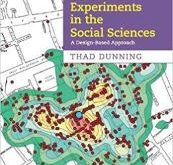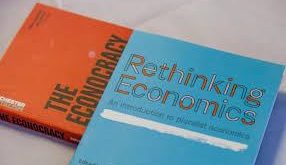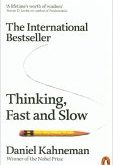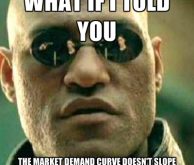from Richard Smith We ecosocialists have a practical answer. We accept the science that to prevent runaway global warming “greenhouse emission must be reduced by 45 percent from 2010 levels by 2030, and by 100 percent by 2050.” We agree with the IPCC that this will require “deep emissions reductions in all sectors.” We agree that it will require “far-reaching transitions in energy, land, infrastructure, and manufacturing,” that it will require “systems transitions” (indeed, more than they...
Read More »Randomization and experimental design in the social sciences
from Lars Syll Thad Dunning’s book Natural Experiments in the Social Sciences is a very useful guide for social scientists interested in research methodology in general and natural experiments in specific. Dunning argues that since random or as-if random assignment in natural experiments obviates the need for controlling potential confounders, this kind of “simple and transparent” design-based research method is preferable to more traditional multivariate regression analysis where the...
Read More »The wonderful world of free market drugs
from Dean Baker I write about the possibility of producing drugs without patent monopolies frequently for several reasons. First, drugs can be essential for people’s health or even life. It should not be a struggle for people to pay for them. Second, there is a huge amount of money at stake, way more than in almost any other realm of public policy. Third, it is such a great example where government intervention, in the form of patents and related monopolies, creates the problem. This is...
Read More »Economics education needs a revolution
from Lars Syll Economics has become a rather quaint and highly guarded discipline. We urgently need to update economics education to change this – because economics, as taught in universities, does not reflect or speak to many of the issues of the real world, be they political, environmental or social. Take the tricky entanglement between politics and economics, which economists tend to try to avoid. Such an attempt is futile. Sidelining politics, history and broader ideas while teaching...
Read More »The void in neoclassical orthodoxy
from Julie A. Nelson Since the 1990s, I and some other feminist economists have been pointing out that the mainstream discipline of economics has a profoundly masculinist bias. That is, aspects of human nature, experience, and behavior that fit a culturally “macho” mold have been emphasized and elevated, while those that are culturally associated with a lesser-valued femininity have been ignored. The neoclassical orthodoxy focuses on markets and perhaps the public sphere, but categorizes...
Read More »Expected utility theory
from Lars Syll Although expected utility theory is both theoretically and descriptively inadequate, mainstream economists gladly continue to use it, as though its deficiencies were unknown or unheard of. Daniel Kahneman writes — in Thinking, Fast and Slow — that expected utility theory is seriously flawed since it doesn’t take into consideration the basic fact that people’s choices are influenced by changes in their wealth. Where standard microeconomic theory assumes that preferences are...
Read More »How many people are going to buy a second-hand Tesla that needs a $44,000 battery?
from Richard Smith If the bulk of CO2 emissions from cars are produced before the car leaves the showroom then, obviously, the best way to suppress vehicle emissions is to produce as few cars as we need and make them last as long as possible. But of course that runs directly counter to the needs of the capitalist auto industry which must seek to maximize sales by driving repetitive consumption, the faster the cycle the higher the profits. Ever since the 1920s, the auto industry has been...
Read More »Sonnenschein-Mantel-Debreu at fifty
from Lars Syll SMD theory means that assumptions guaranteeing good behavior at the microeconomic level do not carry over to the aggregate level or to qualitative features of the equilibrium. It has been difficult to make progress on the elaborations of general equilibrium theory that were put forth in Arrow and Hahn 1971 … Fifteen years after General Competitive Analysis, Arrow (1986) stated that the hypothesis of rationality had few implications at the aggregate level. Kirman (1989) held...
Read More » Real-World Economics Review
Real-World Economics Review






